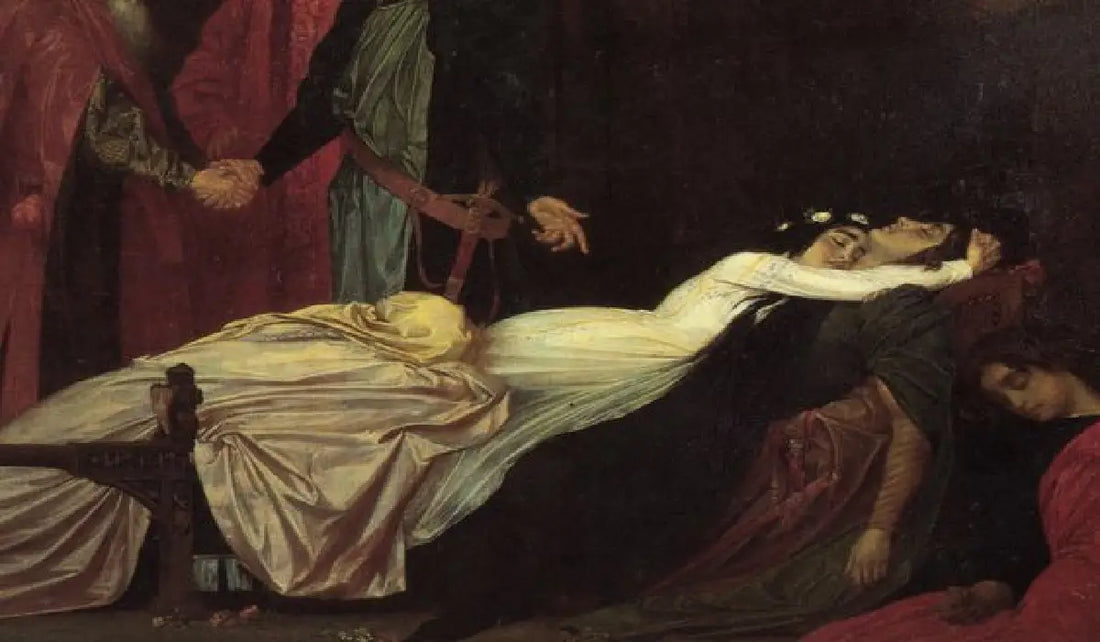
Fate and Fortune in Romeo and Juliet
Jason PerinbamShare
Is it true love—or tragic destiny? Fate and fortune are central forces in Romeo and Juliet, shaping every twist in the lovers’ story. Shakespeare fills the play with signs that their end is inevitable, raising questions about free will, choice, and the cruel hand of luck. This page breaks it down with key quotes, symbolism, and top-tier vocabulary—plus, for complete theme maps, exemplar essays, and 50+ annotated quotes, grab the full Romeo and Juliet Cheat Sheet from our Products Page!
Why Is Fate So Important in Romeo and Juliet?
From the very first lines, Shakespeare makes it clear: this love story will end in tragedy. The lovers are “star-cross’d,” cursed by fate and trapped in a world ruled by feuds, impulsivity, and misfortune.
Shakespeare uses fate to explore the limits of human control—and to make the audience question whether love can survive in a world where everything seems rigged against it.
Shakespeare’s Message on Destiny and Choice
Throughout the play, the characters talk about fate, fortune, and the stars. But it’s not just poetic language—it's a warning. Shakespeare suggests that even when people try to take control of their own lives, they are often powerless against the forces around them.
Romeo and Juliet make choices—but every decision seems to push them closer to their downfall.
- Fate sets the stage
- Fortune twists the plot
- Human error seals the ending
The message? Some tragedies feel inevitable—but we still have a role to play.
Who Represents Fate and Fortune?
-
Romeo – Constantly references fate and fortune, believing he’s a victim of the stars
-
Juliet – Less obsessed with fate, but caught in its trap nonetheless
-
Friar Lawrence – Tries to outsmart destiny but only ends up enabling tragedy
-
The Chorus – Foreshadows the ending before the story even begins
- “A pair of star-cross’d lovers take their life.”
Fate hangs over every scene like a shadow, reminding us: this was always going to end badly.
Romeo’s Battle with Fate
Romeo swings between accepting fate and trying to fight it:
“Then I defy you, stars!” – He thinks he can resist destiny…
But that decision leads directly to his death.
Shakespeare uses Romeo’s impulsive defiance to show how attempts to fight fate can backfire, especially when paired with unchecked emotion.
By the end, we see fate as a kind of tragic puppet master, with love, time, and chance all working against the couple.
Key Vocabulary: Use These in Your Essays
Use these high-level words to impress examiners:
-
Inevitable – Unavoidable; bound to happen
- Fatalistic – Believing everything is predetermined
-
Foreboding – A sense that something bad will happen
-
Cosmic irony – When fate or the universe seems to work against the characters
-
Impulsive – Acting without thinking
- Tragic flaw – A weakness that contributes to a character's downfall
3 Key Quotes + Analysis
1. “A pair of star-cross’d lovers take their life.” – Prologue
- Analysis: This line reveals the tragic ending before the play even begins. The phrase “star-cross’d” suggests that fate—not the characters—controls the story. It builds tension and emphasises the inevitability of their deaths.
2. “O, I am fortune’s fool!” – Romeo (Act 3, Scene 1)
- Analysis: After killing Tybalt, Romeo blames “fortune” instead of himself. Shakespeare personifies fate here, showing how Romeo views his life as controlled by external forces. It also reveals his inability to take responsibility for his actions.
3. “Then I defy you, stars!” – Romeo (Act 5, Scene 1)
- Analysis: Romeo believes he can overcome fate by acting boldly—but this only leads to more tragedy. Shakespeare uses dramatic irony to show how Romeo’s rebellion actually speeds up his destiny, not stops it.
Want Full Notes, Grade 9 Essays & More Quotes?
This is just a snippet of our A Christmas Carol Cheat Sheet, which includes:
✅ Full character profiles for Scrooge, the Ghosts, Cratchits & more
✅ Grade 9 exemplar essays with examiner-style commentary
✅ Complete theme breakdowns (Poverty, Redemption, Class, etc.)
✅ 50+ top quotes with high-level analysis
🚀 Upgrade your revision—download the full guide now!
P.S. Struggling with analysis or quotes? Our text-specific cheat sheets break down An Inspector Calls, A Christmas Carol, and more into Grade 9-ready notes.
Why JP Tutors Hub?
Founded by a straight-A student, our resources are:
✨ Exam-board aligned
✨ Used by thousands of GCSE students
✨ Designed to save you time and boost marks
Follow us for more free tips—or visit our shop to upgrade your revision! 🚀